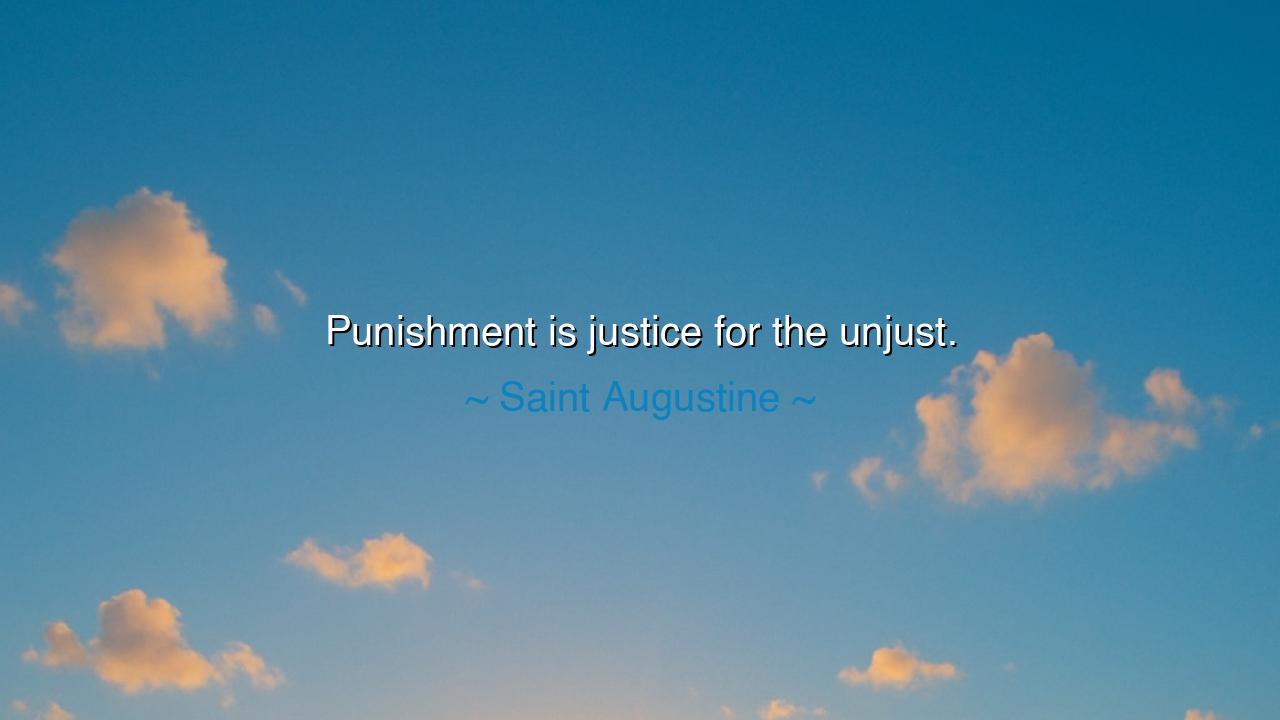
Punishment is justice for the unjust.






The words of Saint Augustine, “Punishment is justice for the unjust,” are like the chime of a solemn bell that resounds through the corridors of time. They remind us that justice is not an empty concept, but a living order that demands balance. Where there is wrongdoing, there must be a reckoning; where there is harm, there must be redress. Augustine, the great philosopher and bishop, spoke as one who gazed deeply into the mysteries of the soul and the fabric of society. He knew that without consequence, evil multiplies, and without justice, the unjust would roam unchecked, leaving ruin in their wake.
The origin of this teaching springs from Augustine’s vision of divine and earthly order. To him, humanity was bound by both heavenly law and earthly law, each reflecting the eternal truth that good must be upheld and evil restrained. Punishment, then, is not cruelty—it is a sacred necessity, a rebalancing of scales tilted by the hands of the wicked. It is the rod that disciplines the wayward, not for the delight of suffering, but for the preservation of justice and the protection of the innocent.
Consider the tale of Socrates in Athens. Though innocent of true crime, he accepted the punishment decreed by the law of his people, drinking the cup of hemlock without fleeing. Why? Because he believed that to defy the lawful order would bring greater harm to the city than his own death. In this paradox, we see Augustine’s meaning: punishment is not always about vengeance, but about the preservation of justice’s integrity. Even when wielded imperfectly, it affirms that no one stands above the law, and that to undermine it invites chaos.
Yet Augustine’s words cut deeper still, for they touch the heart of morality itself. The unjust are those who betray trust, who wound the innocent, who tear the fabric of community with selfishness or violence. To leave such acts unpunished is to abandon the victims to despair and to invite others to follow the same path. Punishment, rightly given, declares to the world that wrongdoing will not stand triumphant. It is a sword raised not to delight in blood, but to defend the weak and restore the harmony of the whole.
But let us not mistake punishment for cruelty. True justice is not blind rage, nor the indulgence of revenge. It is measured, deliberate, and guided by wisdom. When punishment exceeds the crime, it ceases to be justice and becomes injustice itself. Augustine, in his depth of thought, reminds us that the aim is correction, not destruction; restoration, not humiliation. For even the unjust are not beyond redemption, and sometimes the hand of discipline awakens the soul to repentance.
The lesson for us is clear: if we would live in a world of order, we must not shrink from consequence. Parents must guide children with firm yet loving discipline. Communities must uphold laws with fairness. Leaders must not tremble before the powerful when they do wrong. Each person must understand that actions bear weight, and that where there is transgression, there will be response. To ignore this truth is to surrender society to chaos, where the wicked prosper and the righteous despair.
Therefore, let each of us act with balance. Demand punishment where injustice reigns, but demand it in proportion, tempered with mercy. Uphold the laws of your community, but do not let them harden your heart against compassion. Remember always that justice and mercy are twin pillars—without justice, mercy is meaningless; without mercy, justice becomes cruelty.
So let Augustine’s words endure: “Punishment is justice for the unjust.” They are not merely a reminder of law, but of the eternal dance between wrong and right, discipline and freedom, judgment and grace. To walk this path with wisdom is the task of every generation. For in doing so, we preserve not only order, but also the dignity of humanity itself.






AAdministratorAdministrator
Welcome, honored guests. Please leave a comment, we will respond soon